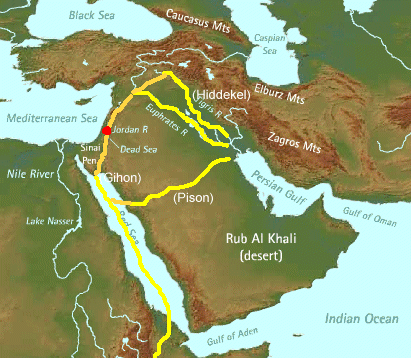Patriarch Joseph unlikely to have come to power under Hyksos king
by
Damien F. Mackey
“Joseph shaved when going to see Pharaoh,
hinting at a native Egyptian administration.
Asiatics usually wore beards,
Egyptians typically were clean-shaven”.
Jon Gleason
Genesis 41:14: “So Pharaoh sent for Joseph, and he was quickly brought from the dungeon. When he had shaved and changed his clothes, he came before Pharaoh”.
According to Nahum M. Sarna, though, Joseph was likely contemporaneous with the Hyksos rule of Egypt:
https://www.churchofjesuschrist.org/study/ensign/1987/12/research-and-perspectives/who-was-the-pharaoh-who-knew-not-joseph?lang=eng
Who Was the Pharaoh Who “Knew Not Joseph”?
By Nahum M. Sarna
The biblical account of Goshen, slavery, brickmaking, and midwives matches well with current knowledge about Egypt, according to a modern scholar.
Israel sojourned 430 years in Egypt. Recent archaeological discoveries and increasing knowledge about languages and cultures have helped us understand that sojourn as never before. …. The biblical account accurately portrays two ancient civilizations, which were at first allies, then bitter enemies. It takes us from Joseph, who rose to power under the Egyptian dynasty known as the Hyksos, up to dire bondage two dynasties later under the Pharaoh Ramses II.
….
The Hyksos were Asiatics who ruled Egypt for about a century and a half. …. The name itself means “Rulers of Foreign Lands.” The Hyksos were a conglomeration of ethnic groups who infiltrated Egypt over a long period in ever-increasing numbers, probably coming from Canaan.
By about 1720 B.C.., they controlled the Eastern Delta of the Nile and had established their capital at Avaris. …. By about 1674 B.C., a Hyksos king with the Semitic name Salitis occupied Memphis, the ancient capital of Egypt. The Hyksos constituted the XVth and XVIth Dynasties, adopting the style and bureaucratic institutions of the traditional pharaohs. Gradually, Semites replaced Egyptians in high administrative offices. The rise of Joseph to power and the migration of the Hebrews fits in well with what is known of the era of Hyksos rule. ….
[End of quote]
The only thing that can be said in favour of the Hyksos being rulers at the time of the Patriarchs, Jacob and Joseph, is that their conventional dating - which we now know, in fact, to be hopelessly wrong - fits relatively well with the standard biblical dates.
Jon Gleason gives some reasons why Hyksos was not the historical period for Joseph (2012): A King Who Knew Not Joseph | Mind Renewers
… many scholars put Joseph in the Hyksos period so we’ll take a few minutes on it.
….
One reason cited is dating. Some think Galatians 3:17 puts Abraham in the time of Senusret III, and thus they put Joseph in the time of the Hyksos. This is not the only way to understand Galatians 3:17, so alone it is not conclusive.
Another reason sometimes given is the idea that a foreign Pharaoh was more likely to promote a Hebrew than a native Egyptian would be. I give this little credence — the record of Genesis 41 provides enough explanation for his promotion, even if one forgets the sovereign working of God (and one should never forget that).
Joseph doesn’t fit in the Hyksos period very well:
Joseph shaved when going to see Pharaoh, hinting at a native Egyptian administration. Asiatics usually wore beards, Egyptians typically were clean-shaven.
Joseph was placed “over all the land of Egypt” (Genesis 41:41, 43). The Hyksos only ruled the northern part of Egypt.
Joseph’s wife was a daughter of a sun-priest (Genesis 41:45) — a great honour under a native Egyptian, less so to a Hyksos.
Egypt’s rulers held Hebrews in abomination (Genesis 43:32). The Hyksos would likely have seen Hebrews (from the same region) as potential allies, not abominable enemies.
They also hated shepherds (Genesis 46:34, etc.). Though the Hyksos may or may not have been “Shepherd Kings,” there is no evidence they hated shepherds, and it makes little sense given their background.
Genesis 47:18-20 doesn’t make sense if the Egyptians were slaves under the Hyksos.
While the identity of Joseph’s Pharaoh can’t be certain, if one takes the clues in the Biblical record seriously it is hard to see how Joseph fits in the reign of the Hyksos.
“More and Mightier than We”
Exodus 1:8-10
8 Now there arose up a new king over Egypt, which knew not Joseph.
9 And he said unto his people, Behold, the people of the children of Israel are more and mightier than we:
10 Come on, let us deal wisely with them; lest they multiply, and it come to pass, that, when there falleth out any war, they join also unto our enemies, and fight against us, and so get them up out of the land.
Verse eight hints at more than the normal succession of father to son — a change of dynasty, perhaps, to one with no appreciation for Joseph and his service to Egypt. There were many dynasty changes in Egyptian history — but in many cases, appreciation for past service would continue. That would not be the case if the new king was a foreigner, especially if he came to power through an invasion. .…
[End of quotes]
The era of Moses was the pyramid building era of the Fourth Dynasty (Old Kingdom), which must be aligned with the similarly mighty Twelfth Dynasty (Middle Kingdom).
And this may have been a new, foreign (even Hyksos) dynasty.
Pharaoh Ramses II ‘the Great’, thought by many to be the Pharaoh of the Oppression based on Genesis 1:11, “So they put slave masters over them to oppress them with forced labour, and they built Pithom and Rameses as store cities for Pharaoh” - clearly a later editorial addition - belongs to a much later era. See e.g. my article:
The Complete Ramses II
(6) The Complete Ramses II | Damien Mackey - Academia.edu


Comments